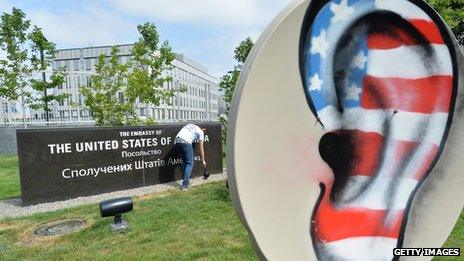US-EU bugging claims: Is it OK for US to spy on allies?
- Published

Claims of US spying have sparked protests in some European countries
Allegations that the US bugged European embassies and EU offices have caused outrage among some leaders. But the US Secretary of State John Kerry says its activities were "not unusual". As the political fallout continues, the BBC's Security Correspondent Gordon Corera asks whether it is ever acceptable for a country to spy on its allies.
Spies spy. But on whom? Their enemies of course. But what about their friends?
History suggests that it is tempting enough for it to happen on occasion but it also carries risk. If you are found out, the consequences can be major embarrassment or worse.
You could imagine - hypothetically of course - that if you were the British prime minister or chancellor about to go into a major European summit at which - hypothetically again - Britain's budget rebate was up for discussion, that it might be quite useful to know in advance what other countries' real positions were on this, what their bottom line and fallback positions were, what their concerns might be and what alliances they had made with other countries ahead of the meeting.
That might be obtainable through traditional diplomacy or it might require secret intelligence - for instance, a spy on the other side or the interception of communications and emails. But would you risk it?
'Huge great row'

Intelligence agents at GCHQ assess how the UK government could obtain certain information
Spy services like Britain's MI6 and GCHQ do not set their own tasks. They work off a priority list set by the Joint Intelligence Committee and agreed by ministers, which might include a range of issues from Iran's nuclear programme through to Chinese cyber-espionage - but may also include intelligence on international summits and negotiations.
Spy agencies will then look for ways of gathering intelligence on these issues and then put proposals up to ministers. A proposal would list what intelligence is being sought, how it fits with the requirements set, how it would be obtained and then - crucially - what the downside would be if it went wrong.
"A huge great row," is the realistic answer according to one former British ambassador. So what operations do they sign off on and do they include spying on friends?
Well, that is of course, secret.
There are a few countries who - supposedly - do not spy on each other. The US and UK have a formal no-spy deal for instance which means they are not supposed to run their own operations in the other's country without consultation.
The US and France have tried to agree a similar deal but failed.
Even before the Snowden revelations, there were snippets to suggest spying on friends in Europe does take place.
According to the account of one former British intelligence officer who turned against his employers, MI6 may even have had an agent inside the Bundesbank in the 1990s reporting on the movement of German interest rates and the like.
'Hard to ignore'
Another curious story was recently uncovered by Alan Judd, a former diplomat turned writer.
A 1993 American non-fiction book claimed that in the mid 1980s, a then junior aide on the British Foreign Office negotiating team over the European Single Market approached the French and offered to give away his side's negotiating position because he felt the UK was insufficiently pro-European.
"I read it and I thought it was interesting. It's plausible and it is not a bad story for a novel," says Judd, who used it as the basis for his book Uncommon Enemy.
"It would be harder to believe, say, that the British and French were going around trying to recruit spies on each other. It is easier to believe that if there were crucial negotiations going on and someone offers you the intelligence, it would be hard to ignore it."
George Eustice MP recently raised the issue of the 1980s spy with the Foreign Office. A minister replied that the allegations had been "investigated at the time and no substantiating evidence was found".
The US has also expressed its anger at Israel when its spies have been discovered at work.
The most famous case is Jonathan Pollard, a US intelligence analyst who was convicted of espionage in 1987 and who remains in jail despite a very active and vocal campaign from Israel to have him released.
His case was a message from Washington to Israel - don't think that because we are allies you can get away with this.
Ammunition
Different countries react to spying claims in different ways.
French President Francois Hollande said that the consequences of the bugging claims were "firstly that it stops at the earliest possible date - that is to say immediately".

East Germany's secret police collected information about its own residents
"Thereafter we may have negotiations or transactions in all areas once this guarantee has been obtained."
Germany has been the most vocal in its anger at the claims over US spying. This is because of the country's experience over recent decades and particularly the role of the Stasi in East Germany who spied voluminously on their own people.
Revulsion at that experience has created a particular focus on privacy.
Some in the European Parliament have also been concerned about US spying for many years with concern focusing on the Echelon network , externalmore than a decade ago and the fear it might be used against European companies or in trade negotiations.
Edward Snowden's revelations seem to have provided them with more ammunition, especially with US-EU trade negotiations due to start.
Europeans knew the US monitored global communications for signs of terrorist plots. But such a justification does not work with the latest revelations. "I don't think that this risk exists in our embassies or in the European Union," said the French president.
The sheer size of the US intelligence machine and its ability to vacuum up huge amounts of information have also fuelled concerns. The odd bit of spying is one thing, but large scale espionage is another.
And to be discovered doing it may well prove to be more than just embarrassing.